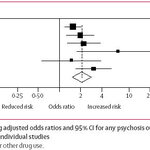
In a recent survey conducted by the University of Maryland’s Center for Food Nutrition and Agriculture Policy, consumers listed tuna, salmon and shrimp as the fish with the highest levels of mercury. But when the question was reversed — which fish had the lowest levels of mercury? — the responses were identical: tuna, salmon and shrimp.
“On one hand, we want pregnant women to eat fish, as there are plenty of benefits to the fetus in terms of cognitive development and other factors,” said university researcher Maureen Storey, “But on the other hand, there is confusion about the risks, so…

